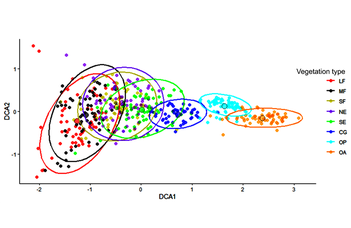Ecological strategies in forest-grassland mosaics – new publication
2024.01.20.

Ecological strategies can provide information about plant community assembly and its main drivers. Researchers from the HUN-REN Centre for Ecological Research, the University of Szeged and the University of Debrecen aimed to reveal the dominant strategies of the vegetation types of forest-grassland mosaics and to deduce the assembly processes responsible for their species composition. Ákos Bede-Fazekas, senior lecturer of our department, co-authored the publication that was led by László Erdős and Khanh Vũ Hồ. The prestigious (Q1, IF = 2.8) scientific journal "Journal of Vegetation Science" published the article in which the researchers highlighted that each of the studied vegetation types was dominated by the stress-tolerator strategy ("S"). This indicates the prominent role of environmental filtering in community assembly. The importance of the stress-tolerator strategy decreased towards the less harsh end of the gradient (i.e., from grasslands to forests), while the competitor strategy ("C") showed a reverse pattern. The ruderal strategy ("R") was weakly correlated with the gradient. The findings suggest that CSR strategies offer a useful tool for studying plant community assembly rules along environmental gradients.

